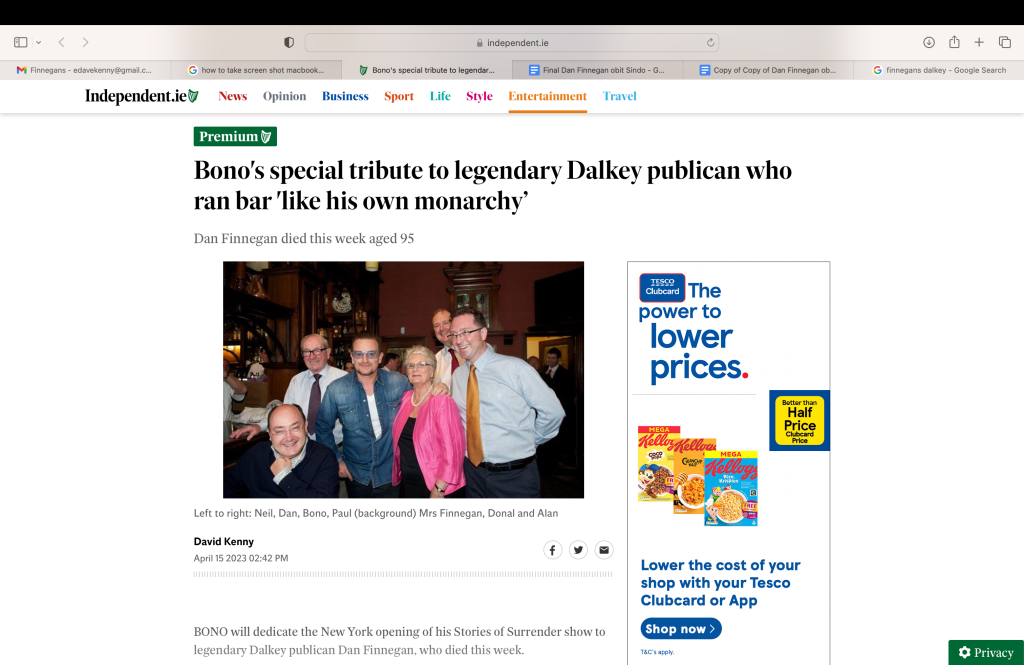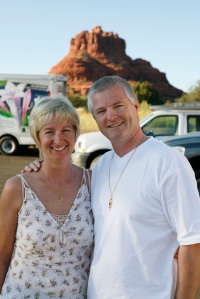
By Dave Kenny, April 15, 2023
BONO will tonight dedicate the New York opening of his Stories of Surrender show to legendary Dalkey publican Dan Finnegan, who died this week.
Much-loved Mr Finnegan, 95, passed away at home in the south Dublin village surrounded by his family. His funeral, literally, brought Bono’s hometown to a standstill.
The U2 frontman has been friends with the Finnegan family for decades and told the Sunday Independent the uncrowned King of Dalkey was akin to a ‘constitutional monarch’.
“Finnegan’s Pub is not just my local. It is its own country with its own laws and customs,” Bono said from the Beacon Theatre in New York, where he was rehearsing for tonight’s show, which is based on his critically-acclaimed autobiography, Surrender.
“It is the domain of Dan Finnegan and his sons. It’s a constitutional monarchy where Dan is its Head of State and his sons run the government,” the singer said.
“Dan’s eldest, Donal – the Taoiseach – is six foot four and, depending on the hour, can appear six foot seven. I would not want to mess with Donal Finnegan. Or his brothers. Or his sisters. Dan’s family are fine people but there is a code, a strictness. A reverence for tradition. Indeed, a respect for opera and for the kind of man who might know how to wear tweed, like my late father Bob.
“Dan loved my Da. They shared a love of opera and stage musicals, and Dan recognised when another prince was present, one who could actually sing. On the occasion when my father silenced the place by singing The Way We Were, followed by The Black Hills of Dakota, Dan looked over at me with something like pity, and I imagined him saying under his breath: ‘Think how far you’d have come if only you had your father’s voice’.
‘I’m so sorry I couldn’t have been there for his funeral. I’m a big fan of the Finnegan family and send them my love.’
While Finnegan’s is Bono’s home from home, his bandmate Edge’s earliest appearance there wasn’t met with the adulation he is accustomed to. Dan’s youngest, Alan, said that Dan was utterly unfazed by – and sometimes unaware of – the A-List stars who have crammed his bar. A-listers who include Penelope Cruz, Javier Bardem, Tom Cruise, Mel Gibson, Brad Pitt, U2, Woody Harrelson, Pamela Anderson, Maeve Binchy, Timothy Dalton, Brian Keenan, Salman Rushdie and actor Matthew Goode of Downton Abbey fame.
Checking cheques
“Dad couldn’t give a damn about the whole celebrity thing, and wouldn’t have known who many of them were,” said Alan. “For example, back in the ’80s there was a raft of stolen cheques going around. One day, Dad rang the bell in a panic looking for Donal. He had a cheque for £30 signed by a name he didn’t know. ‘I’ve two buckos down here. The one at the counter is passing a cheque. It’s definitely one of these stolen cheques going around. Get the guards!’
“Donal told him to hold on while he looked at it. It said ‘Dave Evans’. Dan scratched his head and replied: ‘Let me have a look and see what this plum looks like’.
“They walked out from behind the bar and there’s The Edge, just back from a swim in the Vico. Donal greeted him. Dan wasn’t having any of it. ‘What are you doing, Donal? Get the guards, get the guards!’ Donal pulled him to one side and said: ‘Dad, that’s The Edge from U2 – one of the biggest bands in the world’.
“Dan replied, wearily: ‘THAT yoke? I fecking give up’.
“We told Edge this the other day and he laughed his head off.”
Neil Jordan and his wife Brenda are neighbours of the Finnegans and remembered Dan fondly. “He was the best,” the Oscar-winner said. “A real gentleman publican who built up a great family business and was at the heart of the village for decades.”
Brenda added: “Dan was the father of Dalkey. He will really be missed.”
Speaking from the US, former Dalkey resident, RTE Football Correspondent Tony O’Donoghue, described Mr Finnegan as ‘unique’.
“So sorry to hear about Dan. He was such a decent man, and a great host, yet he never had time for any of the bulls**t which was flying around Dalkey,” the Corkman said.
“He was utterly authentic. I remember one closing time when he was giving everyone their marching orders – which were always obeyed as you didn’t disrespect Dan. We were standing on Sorrento Road wondering what to do next, when he popped his head around the door and, with a grin, said: ‘Tony, what did you think of that match the other night…?
“He had just thrown us out and was all up for a long chat on the street! It was all part of the pub pantomime. He was a great character.”
Local TD, Cormac Devlin, also paid tribute to the Cavan native. “Dan entertained presidents, taoisigh, celebrities, the great and the good and, of course, his loyal, local customers who helped him build Finnegan’s into an internationally acclaimed watering hole.
‘His quick wit will be sadly missed. However, the image of him sitting on his favourite bar stool observing everything will always be fondly remembered by all of us who knew and admired him.”
One guest at his pub will definitely fondly remember her lunch there. Michelle Obama, her daughters and Bono turned the village into a movie set in 2013. Amid scenes of stressed Secret Service men talking into their sleeves and choppers whirling overhead, Dan’s chef son Paul cooked up a feast for the First Lady.

Dan fan: Dave Kenny watches rugby with Dan Finnegan in 2012. (Dan bought the pint.)
“Dan was very proud of Paul,” said Donal Finnegan, who recalled that his mischievous brother took great delight in telling the world’s media Mrs Obama had dined on fish and chips.
Pub regular Andrew Fitzpatrick, Chairman of Monster Entertainment, remembered Dan’s impish side. “The first time I was back in the pub after getting my kidney stones seen to, he met me at the door, put his hand on my arm and said, ceremoniously, ‘Welcome home, you’re a “stone” lighter!’”
Local salon owner Matt Malone recalled one quiet afternoon when he was having lunch in the pub with friends. “It turned 4 o’clock and Dan started to surround our table with high stools. I asked what he was up to. He replied: ‘You’re the only customers here this afternoon. So you’re not getting away!’.”
Dan Finnegan was born in Ballinagh, Co. Cavan in 1927 – the last of 10 children. He went to Dublin to apprentice in the Old Dubliner pub in Temple Bar and, after a few years, he met his beloved wife Colleen and they decided to emigrate to Canada.
Donal, Neil and CathyAnne were born in Toronto, where Dan worked as a tram driver in Toronto Transit. After eight years, in 1962, they returned and opened a pub in Bride Street with his brother Peter. They sold that in 1970 and Dan and family moved to the sleepy village of Dalkey, where he opened his Sorrento Lounge.
“He was a great social man,” said Donal. “And customers loved him. Whenever he couldn’t remember someone’s name he always called them ‘Me ould flower’, and he got away with it every time.
“He was incredibly proud of all of us, especially my brothers Peter and Alan for opening bars in Spain and he used to love talking about it.
“My other brother, Paul, came to work in Finnegan’s in 1989, and added a new dimension to the pub with his food.’
Tragically, Paul died suddenly nine years ago, leaving a young wife, Ana, and their two children, Isobel and Sean.
“But we’ve kept things going. It was great to watch the old man get over the hump [of his death]. It was very hard, but Mum’s help got him through it.
“A lot of tragic events happened in his life,” Donal continued, also referencing Neil’s rugby accident as a teen which has confined his acerbically witty brother to a wheelchair.
Alan Finnegan recalled the last few weeks of Dan’s life. “I really came to appreciate the relationship my siblings had with him. I began to understand that we’d all been his babies once and that the time had come for us to all return that love and care he’d shown us as a family.
“Family businesses can be battlefields, full of broken relationships and recrimination. That never happened in our family. At least nothing that wasn’t forgotten about or agreed upon the next day. Dad was a great man and we all loved him.”
Dan Finnegan, father of the late Paul Finnegan, is survived by his wife Colleen, Donal, Neil, CathyAnne, Michelle, Peter, Alan and a wide circle of family and friends.
As one who knew Mr Finnegan well for nearly 40 years put it: ‘It was always happy hour in the pub when Dan was around.’


